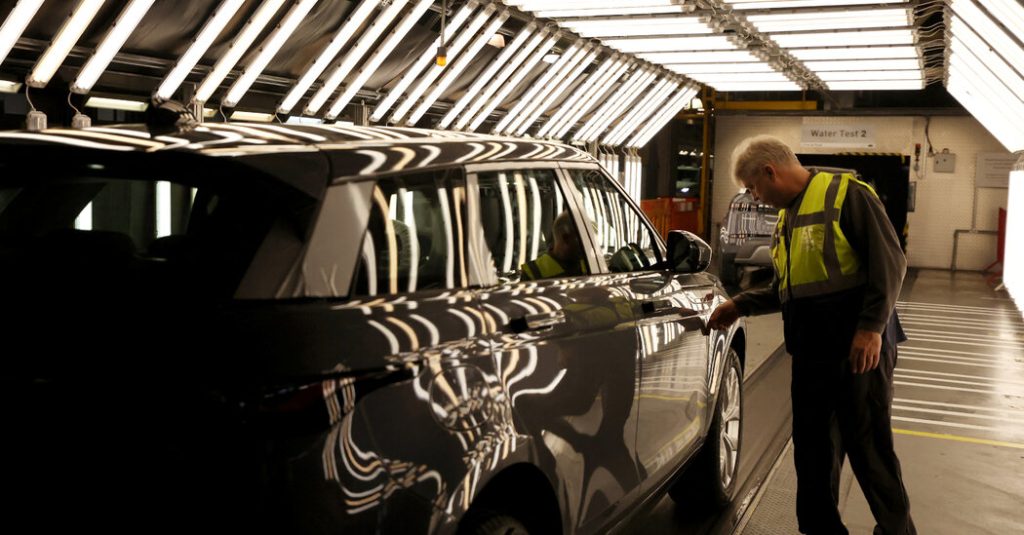The 25 percent tariffs imposed by President Trump on imported cars have added to the pressures on vehicle manufacturers around the world, but the pain could be particularly acute in Britain’s venerable but flagging auto industry.
Britain exports more than 70 percent of the cars that it makes. In 2024, it sent about 101,000 of those vehicles — about 17 percent of car exports, worth 7.6 billion pounds (about $10.1 billion) — to the United States, according to the Society of Motor Manufacturers and Traders, an industry group. Tariffs now threaten to close what had been one of Britain’s largest markets.
Over the decades, Britain has built a reputation for producing innovative and iconic vehicles like the Land Rover Defender and the Morris Minor, which helped make car ownership affordable as the country emerged from World War II.
In recent years, though, the auto industry has struggled to keep pace as it navigates obstacles including the global shift to electric vehicles and Britain’s exit from its main export market, the European Union.
The annual number of cars made in Britain has fallen nearly 50 percent since the end of the last decade, to about 770,000. It now imports far more cars than it makes.
Given the Trump administration’s rapid policy swings, it is impossible for auto industry executives to know what level of tariffs will stick. But Washington’s moves are already bad news for some of Britain’s carmakers, which view the United States as a crucial growth market.
“This is about a very unsettling move for U.K. manufacturing,” said Peter Wells, a car expert at Cardiff University in Wales.
Mr. Wells said companies would most likely be forced to alter their plans, like production runs and shipping. “So already it’s costing money to try and deal with the volatility,” he said.
JLR, the maker of Jaguar and Land Rover vehicles, said it would suspend shipments to the United States for April. The company, which is owned by India’s Tata Motors, is one of the largest vehicle manufacturers in Britain, but 28 percent of its sales over the last year were in North America, where it does not make cars.
Any long-term changes in the United States are likely to have large implications for Britain’s automakers. The United States last year shipped only 18,000 vehicles to Britain, which imposes a 10 percent tariff on U.S. imports.
Some European models from American automakers do well in Britain. The Ford Puma, which is made in Romania in a joint venture, has recently been the top-selling model in Britain.
British car manufacturing is now dominated by a small group of international companies, including Nissan, which operates a large plant at Sunderland; BMW, which makes the Mini; and Toyota.
To keep attracting investment, especially in new electric models, these plants need to be able to compete with rivals around the planet. Executives and analysts say the industry faces a raft of challenges, including high energy costs and stress on the network of suppliers of parts and services after Brexit.
“Ultimately, the U.K. is not a competitive place to be building cars today,” Alan Johnson, Nissan’s senior vice president for manufacturing in the region, told a parliamentary hearing last week.
Stuart Bradley, principal engineer at Warwick Manufacturing Group, a part of the University of Warwick, said he thought that high-priced brands from carmakers like JLR or Rolls-Royce Motor Cars might have a brighter future in Britain than what he called “commodity” producers.
“I think the high-value market is going to carry on to be quite strong,” he said.
The unions that represent the estimated 200,000 workers in auto manufacturing in Britain worry that the tariffs are just the latest in a series of blows that could lead to job losses or even plant closings.
Some manufacturers have closed British plants in recent years. In 2021, for instance, Honda shut down a plant at Swindon that employed 3,500 people.
Unite, a trade union that represents around 70,000 autoworkers, estimates that the British car industry is operating at just over half capacity, probably sapping the profitability that comes from spreading costs over large volumes.
“It’s not sustainable,” said Des Quinn, Unite’s national officer for automotive. “The whole sector is in crisis.”
Much depends on the difficult transition to electric vehicles. The industry says it is being squeezed by the British government’s requirement to phase out sales of the bulk of gasoline- and diesel-powered cars by 2030.
Britain had made rapid advances in increasing its electric car fleet. Britain led Europe, for instance, in sales of electric cars last year, according to the British government.
Critics, though, say strict government-imposed quotas for electric vehicle sales have encouraged imports of electric vehicles like Teslas, which are made in Germany or China, at the expense of the domestic industry. Chinese automakers like BYD are also making inroads.
The question is whether the British-based makers can catch up in the coming years — especially in the production of smaller, cheaper electric cars for ordinary consumers.
“I’m not entirely confident that all of the industry will come through unscathed,” Mr. Wells said.


